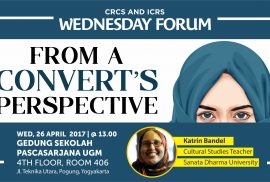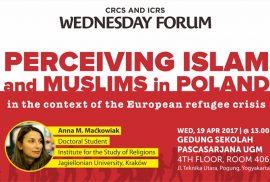
Abstract
Positionality is an important issue in the humanities and social sciences today. What is the relationship of the researcher to the topic she/he is discussing? From what position does she/he speak? To me personally as European living and working in Indonesia, this has always been challenging question. It has become even more complex and challenging since I converted to Islam. Only one essay in my newest book (2016) is explicitly about this, but basically the book is written from the perspective of someone in the process of crossing over (converting) and reflects on the ambivalence of this process.
Speaker
Katrin Bandel was born in 1972 in Wuppertal, Germany. She has been living in Yogyakarta since 2002, where she teaches at the Master Program for Religious and Cultural Studies at the Sanata Dharma University. She has published three books, the newest of which is Kajian Gender dalam Konteks Pascakolonial (2016).
Look at the full poster of the event here.

Yogyakarta telah lama menjadi rumah yang aman bagi berbagai tradisi, keyakinan, dan paham pemikiran yang beragam. Tetapi Daerah Istimewa ini belakangan disorot karena banyaknya aksi vigilantisme yang dilakukan sejumlah kelompok massa baik yang berlatar belakang agama atau politik. Aksi-aksi vigilantisme yang menyasar kelompok-kelompok sosial dan keagamaan minoritas menimbulkan pertanyaan apakah Yogyakarta, yang dikenal sebagai kota pendidikan dan pusat kebudayaan Jawa yang menekankan pada harmoni sosial, sudah berubah menjadi daerah yang intoleran? Laporan ini menunjukkan bahwa vigilantisme terhadap minoritas tidak cukup secara sederhana dipahami sebagai ekspresi konservatisme keagamaan dan intoleransi para pelaku terhadap minoritas, tetapi juga merupakan bagian dari proses perubahan sosial dan struktural yang diantaranya dipengaruhi oleh dinamika seputar status keistimewaan Yogyakarta. Tidak bisa dipungkiri, sektarianisme yang menguat belakangan ikut berpengaruh, tetapi seringkali kekerasan terhadap minoritas lebih tampak sebagai alat mobilisasi kelompok-kelompok kepentingan tertentu untuk mempertahankan basis sosial-politik yang menentukan kendali mereka atas ruang dan sumber daya.
_________________________
Judul: Krisis Keistimewaan: Kekerasan terhadap Minoritas di Yogyakarta
Penulis: Mohammad Iqbal Ahnaf & Hairus Salim
Penerbit: CRCS UGM
ISBN: 978-602-72686-7-8
Tebal: 134 halaman; 15×23 cm
Cetakan Pertama: April 2017
Harga: Rp60.000,00
__________________________
Narahubung untuk mendapatkan buku ini:
Divisi Marketing CRCS UGM
Gedung Lengkung Lantai 3
Sekolah Pascasarjana Lintas Disiplin Universitas Gadjah Mada
Jl. Teknika Utara, Pogung, Yogyakarta, Indonesia 55281
Telephone/Fax: 0274-544976
Lihat juga buku-buku publikasi CRCS yang lain di sini.

Yogyakarta telah lama menjadi rumah yang aman bagi berbagai tradisi, keyakinan, dan paham pemikiran yang beragam. Tetapi Daerah Istimewa ini belakangan disorot karena banyaknya aksi vigilantisme yang dilakukan sejumlah kelompok massa baik yang berlatar belakang agama atau politik. Aksi-aksi vigilantisme yang menyasar kelompok-kelompok sosial dan keagamaan minoritas menimbulkan pertanyaan apakah Yogyakarta, yang dikenal sebagai kota pendidikan dan pusat kebudayaan Jawa yang menekankan pada harmoni sosial, sudah berubah menjadi daerah yang intoleran? Laporan ini menunjukkan bahwa vigilantisme terhadap minoritas tidak cukup secara sederhana dipahami sebagai ekspresi konservatisme keagamaan dan intoleransi para pelaku terhadap minoritas, tetapi juga merupakan bagian dari proses perubahan sosial dan struktural yang diantaranya dipengaruhi oleh dinamika seputar status keistimewaan Yogyakarta. Tidak bisa dipungkiri, sektarianisme yang menguat belakangan ikut berpengaruh, tetapi seringkali kekerasan terhadap minoritas lebih tampak sebagai alat mobilisasi kelompok-kelompok kepentingan tertentu untuk mempertahankan basis sosial-politik yang menentukan kendali mereka atas ruang dan sumber daya.
_________________________
Judul: Krisis Keistimewaan: Kekerasan terhadap Minoritas di Yogyakarta
Penulis: Mohammad Iqbal Ahnaf & Hairus Salim
Penerbit: CRCS UGM
ISBN: 978-602-72686-7-8
Tebal: 134 halaman; 15×23 cm
Cetakan Pertama: April 2017
Harga: Rp60.000,00
__________________________
Narahubung untuk mendapatkan buku ini:
Divisi Marketing CRCS UGM
Gedung Lengkung Lantai 3
Sekolah Pascasarjana Lintas Disiplin Universitas Gadjah Mada
Jl. Teknika Utara, Pogung, Yogyakarta, Indonesia 55281
Telephone/Fax: 0274-544976
Atau melalui WA: 082141724150 (Bandri)
Lihat juga buku-buku publikasi CRCS yang lain di sini.

Abstract
The EU countries have been inefficiently managing the latest European migrant crisis, among them Poland was particularly unsuccessful. Contemporary discourse on refugees from the Middle East in Poland revolves around the following issues: the danger of altering Polish culture, the increase of the likelihood of terrorism, and the postulate of empathy towards people threatened by war. The religious factor plays a significant role in this discourse, since refugees who come from predominantly Muslim countries from a group of special interest in this Catholic-majority state. Halina Grzymała-Moszczyńska, Adam Anczyk, and Anna M. Maćkowiak have examined, qualitatively, how Poles perceive Islam, and how this image may be associated with attitudes towards refugees. The aim of this study was to analyze narratives about Islam and the religious Other, emerging from partially structured interviews. The questionnaire, containing citations from the Bible, the Quran, and the Bhagavad Gita served as the trigger for interviews conducted after filling it out.
Speaker
Anna M. Maćkowiak is a doctoral student at the Department of Phenomenology and Anthropology of Religion, Institute for the Study of Religions, Jagiellonian University, Krakow. Currently she is beginning to realization of her individual research grant (Preludium) concerning constructing meanings of selected Indonesian religious rituals by hosts, tourists, and travellers. Her academic interests and activities pertain also to inter-religious relations, religious syncretism, and the influence of religions on daily life of Indonesian and Poles.
Look at the full poster of the event here.
Jonathan D Smith | CRCS | Esai

Terdapat banyak gerakan environmentalis di Indonesia, baik yang dipimpin oleh para aktivis lingkungan maupun kelompok-kelompok lokal. Gerakan menentang proyek reklamasi Teluk Benoa, Bali; gerakan melawan pembangunan pabrik semen di Kendeng, Jawa Tengah; dan gerakan Save Aru, Maluku, adalah sekian contohnya. Apakah agama ikut berperan dalam gerakan-gerakan ini? Apakah gerakan lokal ini memiliki hubungan dengan gerakan environmentalis global yang sedang tumbuh?
Aspek lokal dan global adalah elemen krusial dalam gerakan environmentalis: problem lingkungan hidup tak mengenal batas. Iklim yang berubah cepat melahirkan tantangan yang mendesak secara global dan lokal. Negara-negara dunia pelan-pelan mulai ikut berperan dalam upaya pengurangan emisi karbon sementara komunitas-komunitas lokal di Indonesia sedang menghadapi problem tingginya suhu, naiknya permukaan air laut, bencana alam, dan polusi air dan udara.
Hubungan lokal-global dalam gerakan environmentalis-religius
Dalam Konferensi Perubahan Iklim di Maroko pada 2016, negara-negara bertemu untuk menegaskan dukungannya terhadap Kesepakatan Paris 2015 tentang Perubahan Iklim. Kesepakatan yang (hingga November 2016) telah ditandatangani 111 negara ini berkomitmen untuk mereduksi emisi karbon dan mengakui pengaruh manusia terhadap perubahan iklim. Dalam konferensi di Marrakech itu ratusan pemimpin agama dan aktivis lingkungan juga meluncurkan Pernyataan Lintas Iman tentang Iklim.
Tertulis dalam pernyataan itu:
Jonathan D Smith | CRCS | Essay

Indonesia is home to many environmental movements, either led by established environmental activists or by groups of indigenous people. The reclamation project in Benoa Bay, cement mining in Kendeng area, Central Java, and the Save Aru movement are just a few recent examples. Does religion play a role in these movements? Are these local movements related to the growing global environmental movement?
The local and global is a crucial element of environmental movements, because environmental problems defy boundaries. Our rapidly-changing climate poses an urgent challenge that is both global and local. As national governments slowly acknowledge their role in reducing carbon emissions (with some exceptions), local communities in Indonesia are living with the problems of rising temperatures and sea levels, increases in natural disasters, and increasing pollution of our air and water.
Local-global connections in religious environmental movements
In 2016 at the climate summit in Morocco, governments met to affirm their adoption of the 2015 Paris Climate Agreement. Signed by 111 countries (as of November 2016), the agreement commits to reducing carbon emissions and recognizes the human impact on climate change. At the same climate summit in Marrakech, hundreds of religious leaders and environmental activists launched the Interfaith Climate Statement.
The Interfaith Climate Statement included these words:





